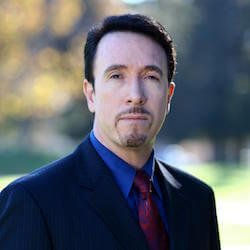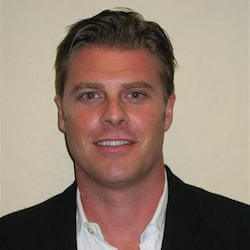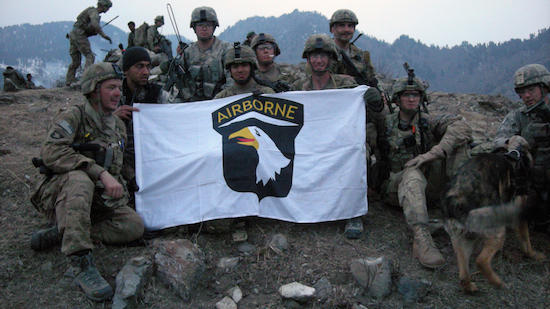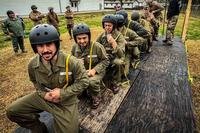
The Hornet's Nest is a new documentary that shows the war in Afghanistan from some different perspectives. There's a lot going on here: much of the footage was shot by the father/son war correspondent team of Mike and Carlos Boettcher, but there's also a good chunk of footage shot by soldiers and (amazingly) some footage taken from captured Taliban cellphones. Longtime Hollywood executives David Salzberg and Christian Tureaud compiled the footage and crafted a film that tells two distinct stories: in the first half, Mike allows Carlos to join him in covering the war in an attempt to connect with his son after spending most of Carlos' childhood away from home covering conflicts around the world. After Carlos returns to the States (and the two share an Emmy for their work), Mike embeds with the Army's 101st Airborne and tells the story of a hellacious nine-day siege in Kunar province.  The film has already opened in select markets (most near military bases) in Texas, Oklahoma, Kansas and Colorado. They're adding another 25 cities this Friday. You can get a complete list of theaters, buy tickets and track upcoming markets here.
The film has already opened in select markets (most near military bases) in Texas, Oklahoma, Kansas and Colorado. They're adding another 25 cities this Friday. You can get a complete list of theaters, buy tickets and track upcoming markets here.
%embed1%
David Salzberg talked to us and explained how they got the footage and what they're trying to accomplish with this film.

Describe what you're trying to do in "The Hornet's Nest." What's the film about?
Well, when we first saw the footage that Mike and Carlos had been shooting (because they were still in Afghanistan when we came onboard), we knew there was something really special because of the perspective of the father/son relationship. With what Mike had been doing as a conflict journalist for 35 years and what the troops and what the Marines go through, we thought there was a real chance to tell a parallel story and make it not a documentary, but make it an immersive narrative film with all real footage.

The original goal was to take this footage and make a film that after you watched it and then you thank an American Service Man or Woman, you would know why you're thanking them. We've been told by the community, and we've been told by the industry that we've made something groundbreaking, where you actually really get to feel and experience what our greatest asset, our citizen soldiers are going through over in Afghanistan.

Tell us how you got involved with Mike and Carlos Boettcher.
Mike and Carlos are the only father and son team to ever embed together and they became the only father and son team to win an Emmy for work on the same story.
They came to us while they were still in Afghanistan. Friends of theirs and friends of ours had seen another film that we had done called The Perfect Game, which had a father and son story element to it. It was also a true story, but it’s a scripted story. They decided to put us together, kind of like peanut butter and chocolate. Between us, with Mike and Carlos and what they had been doing and what Christian and I do as directors and producers, we were able to assemble something that is an immersive narrative film made with all real footage.
We've been told by the guys that were there and the girls that were there that the only thing you don’t get is the smell. You get to physically see and experience what these kids are going through and with no political agenda. It’s humbling to see it.
%embed2%
What period of time does Mike and Carlos’ footage cover?
They were embedding when no one else was really embedding on the front lines. A lot of reporters go over there and they stay back on the bases, but from 2009 to the beginning of 2012, we received about 500 hours of footage. It took us over 2 ½ years. We condensed that footage down into an A and B storyline that’s 95 minutes.
It’s the story of Mike and Carlos, but their story parallels the story of the Marines. In Mike's 35 year career as a conflict journalist, he's had a lot of sacrifice. He's been away way too much, much like the soldiers and Marines. At a point in the film, their journeys just intersect.

Did Mike or Carlos help you as you went through the footage? Did you show them the film while you were working on it or did they just give you their footage and let you create the film?
They turned it over to us. Because of their journalistic integrity, they did not want the film to be about them. We told them that it had to be different than or better than other films. We know other filmmakers that are working on what will be fantastic films in this space, but we really wanted to do something unique because we had such incredible coverage. So we worked with them and then, about three months into it, we started turning in rough cuts.
An interesting thing happened. Early on, we went and met with some of the commanding officers in the Gold Star Families that are involved in the film. One of the commanding officers, Colonel Christian Cabaniss, who is now the Commander of 8th and I, said to us, “Look, I think this film could be really helpful to my people and I think it would help my Gold Stars and it would help my Wounded Warriors to create closure if they see this.”

Obviously when you sit down with a Full-Bird Marine Colonel or 101st Airborne Colonel and you're showing them their people in action, they're gonna be extremely critical and sensitive to what the material is. They humbled us and said, “Guys, it's amazing. Go to the families. Help us with the families.”
Colonel J. B. Vowell and Colonel Cabaniss both said they'd even pay for us to get there. We said, “No, sir.” We started meeting all the families and we never focused-group the film with the traditional Hollywood audience. We worked with the families for over a year and a half, almost two years, and the members of the units. They actually had input into what the cuts were. This whole overall thing became a mission. It's more than a movie.
%embed3%
I got the sense from watching that you actually did some sit-down interviews back here in the states with some of the participants in the film.
Most of the interviews in the film were done right after or while things happened. There are actually some on-camera interviews filmed when Mike was there at the Strong Eagle Battle with the 101st and also in Helmand with the Marines. He also did some interviews when they were back at Joyce and some of these other firebases. The majority of the interviews were in country. We did a couple of pickup interviews with Mike. Christian and I became involved when Mike and Carlos were still in Afghanistan. We started working with them and had started getting footage when they were still there, so we were able to say to them, hey, we need this or we need that.
Captain Justin Roberts, who is also a Chaplain and a 101st Airborne medic named Brit Jacobs both had cameras on the mountain during the nine-day battle at Strong Eagle. Once they realized that our boots, our feet, our mouths were all going the same direction, that we weren't full of it, they allowed us into their lives and they started helping us fill in the holes. We had stuff we wanted to get that would help the story be a better story.

How did you obtain the captured Taliban footage that you used in this film?
Well, once the guys started getting a trust for us that we were doing the right thing and we were actually honoring the fallen and telling their story from their perspective, they started opening up and providing us with stuff that we needed.
One of the things that came to us was a package of captured footage, which happened when our guys in the 101st were fighting the Taliban. The Taliban used their cell phones to videotape what they were doing because they get paid by turning it in. It proves they're fighting Americans. They also use it to show the people they're trying to recruit in Pakistan what it's like to kill an American.
When we got to a point in our editing where we needed this footage and, once it had cleared security, it was like a divine intervention. I don’t think footage from the other side of the battle has ever been used in any other film.
We tested it with the audience to make sure that it wasn’t too much of a shock. Our guys have respect for the Taliban. They're fierce fighters. They're dangerous guys. Certainly, our troops only want to be there to make a difference and the Taliban don’t want us there. They're preying on the population.

You see some amazing things in the film with the way our soldiers and Marines behave to the kids and the local population that you don’t get in the news, but the Afghani people just want lives like we do. They want better lives for their kids than they have. They don’t want the Taliban or anyone else coming in their house and telling them what to do. We’re so blessed back here in the States because we don’t have that. we were fortunate the guys trusted us enough to give us that footage.
%embed4%
You’re planning a high-profile rollout for this documentary.
We're rolling the film out this way because we looked at the success that Lone Survivor had. Obviously, Lone Survivor is a great movie. It's based on a true story. I actually watched that with some SEAL friends of mine and then the next night we all watched The Hornet's Nest.
But Lone Survivor came out in the middle of the country and they got big very quickly because they were a big studio film. You know we made this film basically on the catering budget of Lone Survivor and then we went out and Hollywood didn’t embrace us. Hollywood didn’t think military communities would show up, even though they told us they thought the film was amazing.

So we went to the middle of the country. We came to Dallas and Houston and Atlanta. The folks that we met with were blown away by the film and they provided prints and advertising support. We have other groups that have worked with us: USO, Carry The Load, the Easter Seals Dixon Center, American Airlines and on and on and on. All these groups, whether they are charities or corporations, support the troops. We decided that there was strength in using the heart of the country, working with the heart of the country to come out first in Dallas and Oklahoma City and build from there.
We're gonna spread out through the middle of the country and by Memorial Day we expect to be in 125 to 200 screens. With demand, we will spread to the east coast and west coast on June 6th, New York and L.A. and San Francisco, Boston, Miami. And we're knocking on wood that with success we will actually get a bump and stay in the theaters until Fourth of July. Between Memorial Day, Fourth of July and Veterans Day, you can't pick better holidays to be in the marketplace with an incredible story about amazing folks who serve.
So we're hopeful. We need the support. We need the help. We need the community to engage and be as proud of it as the folks in it and as we are about it. I watched 500 people come in as 500 individuals to see the film in Dallas for the premiere and I watched them leave as one. They all come out talking about making a difference and how they're gonna help those who serve.

It's music to our ears as filmmakers because, if it's state of the heart, it's not state of the art. We made it with real footage. The kids that didn’t come home didn’t come home. There were no retakes. It's all real.
These young men and women serve a country that’s very divided right now. We hope that by showing them in a nonpolitical natural state, by portraying what they do and how they behave, that they have the glue that could bring our country together. They all say the same thing. They give credit to their brother or sister, they never take it for themselves, and then they all say I'm just doing my job. I'm just here to help. For my team, that’s inspiration. All these amazing kids that are working with us who volunteered thousands of hours to make the film. Many of them didn’t serve but they wanted to do something to give back. It’s a real coming together with all these different backgrounds for one common goal. We're all Americans.

You said that the Hollywood studios didn’t really think they could market this film. So are you shouldering the financial risk in putting this film out?
Yes, we are. But it wasn’t that they didn’t think they could market it. It's that they wanted to take it and treat it like a regular film, which means if it doesn’t make money instantly, it would get kicked to the side.
The fact that we have so many families that have paid the ultimate sacrifice involved in the film, we just couldn’t treat it like a regular film. Both Christian and I worked for Peter Guber, who was the Chairman of Sony and is now the Chairman of Mandalay. Peter would tell us that, sometime in your career, if you do this long enough, you will find a story that’s way more important than the film. And this is one of those times.




